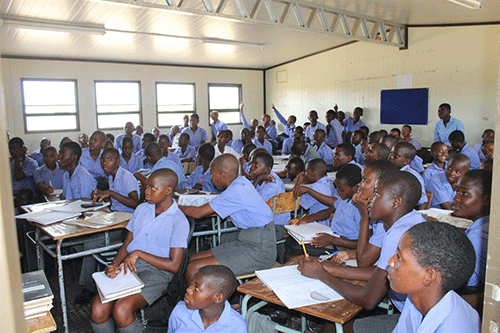RUNDU – Rundu Rural constituency councillor Paulus Mbangu has said Kavango East, specifically Rundu, struggles to solve the class shortage challenge because of a lack of statistical data.
Namibia had its last population census in 2011. The 2021 census was postponed because of a funding challenge.
Yearly, Rundu has been in the news for overcrowded schools, learners are taught in packed spaces where teachers are unable to give all learners enough attention, as some classes have about 90 learners.
“As a regional council, we have also realised that rural areas are under-developed. There are plans to upgrade Divundu village council to a town council and Ndiyona settlement has to be upgraded to a village council,’’ he said during a press conference held by Kavango East governor Bonifatius Wakudumo regarding the issue of stranded learners.
Wakudumo announced that these learners have now started classes in tents at the Rundu Trade Fair grounds.
After the governor’s address, National Council member Mbangu indicated that the regional council has plans to assist Rundu at high speed to develop some rural areas into settlements, and later into local authorities to attract people to remain in those areas.
He said last year, the council advertised to enlist the services of a consultant that has now been appointed to carry out a study at Kayengona, Muroro as well as Ndonga Linena villages.
Once these areas become settlements, council will be able to develop them and declare them as village councils and then later as a town council to attract people to live there, and not all move to Rundu.
“Rundu is densely populated, and it is important for us to develop rural areas into towns so that some of the people can move back there. At the moment, we are in discussions with the directorate of education that is willing to build two secondary schools. We already made a request that one of the secondary schools have to be built in Rundu Rural constituency because there is space.
“We have to look at it from different angles. The last census was in 2011. As a result, we don’t have proper statistical data that could have informed government to plan properly, especially this year. Statistics are important. Guessing does not work. When you are informed by statistics, it can also help in planning,’’ he said.
Wakudumo said the rapid increase of urban migration has led to the population explosion in Rundu over the years.
The governor stated that over 64% of the total residents of the Kavango East region reside in Rundu, as the region has recorded a growth rate of 1.69% per annum, which is contained in the Rundu Town Council’s annual report.
The report also suggests that the local authority now has a total population of 105 785.
“This is evident in the 2022 enrolment in which the directorate of education in Kavango East region recorded 73 767 learners, of which 36 832 learners were in Rundu Circuit, putting pressure on the existing infrastructure,’’ Wakudumo noted. “This is a clear testimony that Rundu Circuit has the highest learner-teacher ratio of 1:60 per class, causing overcrowding in classes,’’ he continued.
The circuit’s enrolment in 2022 shows that Sarusungu Junior and Combined School had 2 726 learners, while Kehemu Primary School had the highest of about 2 998. Rundu Junior Primary School had 1 973, Rundu Senior Primary School had 2 259.
Ndama Junior Primary and Combined School (3 796) and Sikanduko Combined School registered 2 899 learners, Sauyemwa Junior Primary (2 033) and Sauyemwa Combined School 2 275.
“This overcrowding has been the trend for years. However, with the emergence of Covid-19 pandemic, a cohort system was introduced and learners attended classes through groupings, alleviating pressure from these schools in terms of overcrowding in classrooms,’’ he said.
To address this problem, last year, the Ministry of Education, Arts and Culture made N$20 million available for the construction of additional classrooms, with specific emphasis on schools offering advanced subsidiary level (AS).
Although the number of schools where these additional classrooms would have been constructed were identified, the process extended into the 2023 school calendar, and the circuit management committee (CMC) noticed that there is a serious shortage of classrooms as 1 090 learners could not be enrolled in any of the existing schools.
To address the classroom shortages, the committee suggested that some envisaged new classrooms should be withdrawn from schools to construct a new secondary school, and accommodate learners without spaces at the existing secondary schools in the circuit.
As part of the temporary relief measures, efforts were made to acquire 20 tents from the Office of the Prime Minister to accommodate these learners who could not find spaces in the existing secondary schools.


